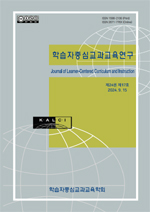
특수교사의 인공지능교육 관심도 분석
Analysis of special education teachers’ interest in artificial intelligence education
- 학습자중심교과교육학회
- 학습자중심교과교육연구
- 제24권 17호
- 2024.09
- 833 - 852 (20 pages)
목적 본 연구는 특수교육에서 인공지능교육(이하 AI교육)의 도입에 있어 특수교사의 AI교육에 대한 관심도를 알아보고, 이를 통해 AI교육을 특수교육 현장에 효과적으로 적용하기 위한 시사점을 도출하고자 하였다. 방법 특수교사의 AI교육 관심도를 파악하기 위해 현직 특수교사 237명을 대상으로 Stages of Concern Questionnaire(SoCQ) 검사도구를 사용하여 온라인 방식으로 조사를 실시하였다. 자료처리는 빈도와 비율을 통해 연구대상의 일반적 특성 및 SoCQ 하위 단계별 강도 백분위 점수를 알아보았고, 특수교사의 배경변인별 AI교육 관심도 차이를 비교하기 위해 t-test 및 분산분석(ANOVA)을 실시하였다. 결과 연구의 결과는 다음과 같다. 첫째, 특수교사의 AI교육에 대한 관심도는 높았고 AI교육 관심 프로파일 유형은 비사용자(Nonuser) 프로파일과 유사하였다. 둘째, 성별과 근무기관에 따른 AI교육의 관심도는 통계적으로 유의한 차이가 없었으며, 학생의 장애유형에서는 3단계(운영)를 제외한 모든 단계에서 감각 및 지체장애 학생을 지도하는 교사의 관심도가 높았고 유의차가 나타났다. 셋째, 교직경력에서는 교직경력이 높을수록 AI교육에 대한 관심도가 높게 나타났고, 학력에서도 학력이 높을수록 AI교육 관심도가 높았으며, 교직경력과 학력에서 모두 유의한 차이가 있었다. 넷째, SW교육 관련 연수시간 및 AI교육 관련 연수시간에서는 SW교육과 AI교육 모두 연수시간이 많을수록 관심도가 높았다. 다섯째, SW교육 지도역량에서는 SW교육 지도역량이 높을수록 AI교육 관심도가 높았고, AI교육 지지도에서는 AI교육 지지가 높을수록 관심도도 높았다. 결론 이러한 결과에 따라 특수교사의 AI교육에 대한 관심도를 높이기 위한 방안으로 특수교육에서 AI교육이 효과적임을 특수교사에게 홍보하고, 장애유형에 따른 AI교육 방법과 교수학습 자료 등을 충분히 제공할 필요가 있다. 그리고 특수교사가 AI교육 관련 역량을 함양할 수 있도록 연수과정 신설 및 전문가 협업기회 제공 등의 국가차원의 정책적 지원이 필요하다.
Objectives This study sought to investigate special education teachers' interest in artificial intelligence education(hereinafter referred to as AI education) in the introduction of special education, and to derive implications for effectively applying AI education to special education fields. Methods In order to investigate the interest in AI education of special education teachers, 237 current special education teachers were surveyed online using the SoCQ test tool. For data processing, the general characteristics of the study subjects and the intensity percentile score for each SoCQ sub-stage were investigated through frequency and ratio, and t-test and ANOVA were conducted to compare the difference in AI education interest by special education teachers' background variables. Results The results of the study are as follows. First, special education teachers' interest in AI education was similar to the non-user profile and their interest in the impact of AI education was relatively low. Second, there was no statistically significant difference in interest in AI education according to gender and working institution and in terms of student disability type, the interest of teachers teaching students with sensory and physical disabilities was high in all stages except stage 3(operation), a significant difference appeared. Third, in terms of teaching experience, the higher the teaching experience, the higher the interest in AI education. In terms of educational background, the higher the educational level, the higher the interest in AI education. There was a significant difference in both teaching experience and educational background. Fourth, in terms of SW education-related training hours and AI education-related training hours, the more training hours there were, the higher the level of interest in both SW education and AI education. Fifth, in terms of SW education competency, the higher the SW education competency, the higher the interest in AI education, and in terms of AI education support, the higher the support for AI education, the higher the interest. Conclusions According to these results, as a way to increase special education teachers' interest in AI education, promote AI education to special education teachers so that they can be effective and interested in students with disabilities, and provide sufficient AI education methods and teaching and learning materials according to the type of disability. Needs to be. In addition, national-level policy support is needed, such as providing opportunities for expert collaboration and establishing new training courses so that special education teachers can develop AI education-related capabilities.
Ⅰ. 서론
Ⅱ. 연구 방법
Ⅲ. 연구결과
Ⅳ. 논의 및 제언
참고문헌